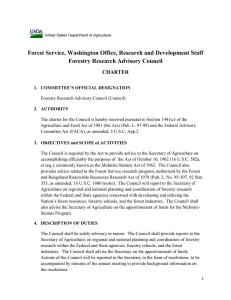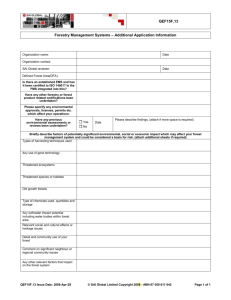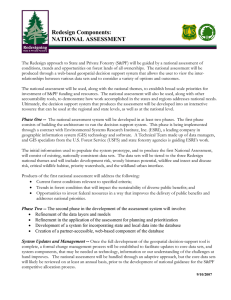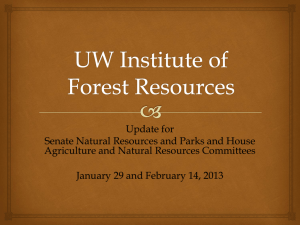Document 10484426
advertisement
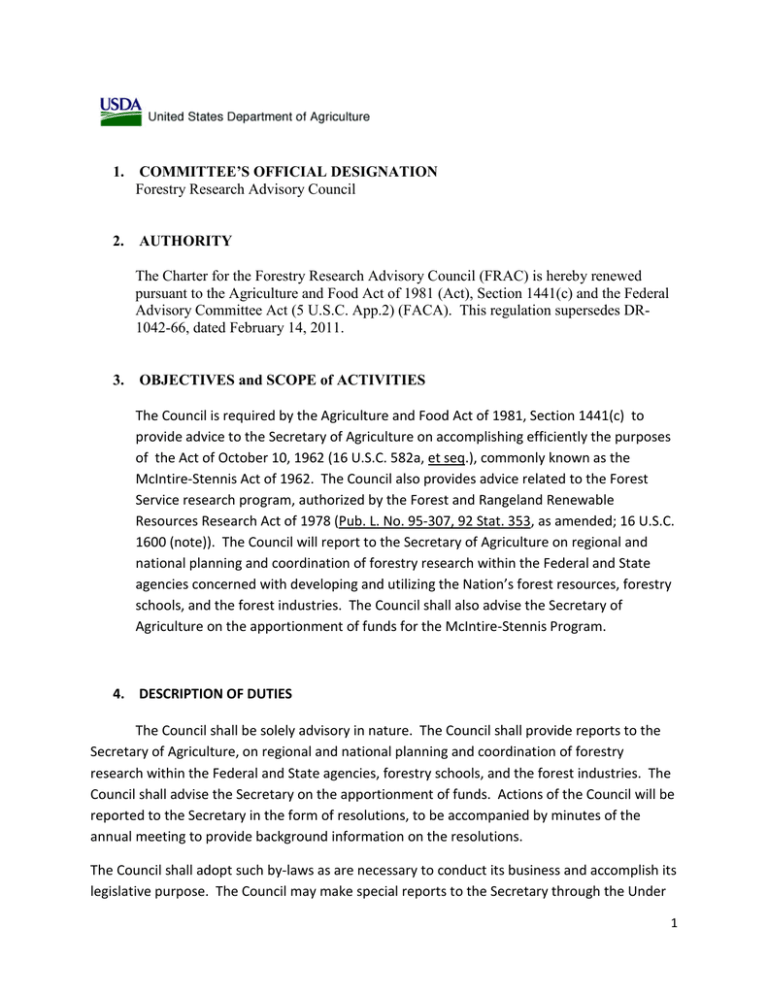
1. COMMITTEE’S OFFICIAL DESIGNATION Forestry Research Advisory Council 2. AUTHORITY The Charter for the Forestry Research Advisory Council (FRAC) is hereby renewed pursuant to the Agriculture and Food Act of 1981 (Act), Section 1441(c) and the Federal Advisory Committee Act (5 U.S.C. App.2) (FACA). This regulation supersedes DR1042-66, dated February 14, 2011. 3. OBJECTIVES and SCOPE of ACTIVITIES The Council is required by the Agriculture and Food Act of 1981, Section 1441(c) to provide advice to the Secretary of Agriculture on accomplishing efficiently the purposes of the Act of October 10, 1962 (16 U.S.C. 582a, et seq.), commonly known as the McIntire-Stennis Act of 1962. The Council also provides advice related to the Forest Service research program, authorized by the Forest and Rangeland Renewable Resources Research Act of 1978 (Pub. L. No. 95-307, 92 Stat. 353, as amended; 16 U.S.C. 1600 (note)). The Council will report to the Secretary of Agriculture on regional and national planning and coordination of forestry research within the Federal and State agencies concerned with developing and utilizing the Nation’s forest resources, forestry schools, and the forest industries. The Council shall also advise the Secretary of Agriculture on the apportionment of funds for the McIntire-Stennis Program. 4. DESCRIPTION OF DUTIES The Council shall be solely advisory in nature. The Council shall provide reports to the Secretary of Agriculture, on regional and national planning and coordination of forestry research within the Federal and State agencies, forestry schools, and the forest industries. The Council shall advise the Secretary on the apportionment of funds. Actions of the Council will be reported to the Secretary in the form of resolutions, to be accompanied by minutes of the annual meeting to provide background information on the resolutions. The Council shall adopt such by-laws as are necessary to conduct its business and accomplish its legislative purpose. The Council may make special reports to the Secretary through the Under 1 Secretary for Natural Resources and Environment, in consultation with the Under Secretary for Research, Education, and Economics. 5. AGENCY OR OFFICIAL TO WHOM THE COMMITTEE REPORTS The Council reports to the Secretary through the appropriate Under Secretary for Natural Resources and Environment, in consultation with the Under Secretary for Research, Education, and Economics. 6. SUPPORT Clerical and administrative support for the Council will be provided by the Forest Service, USDA. 7. ESTIMATED ANNUAL OPERATING COSTS/STAFF YEARS Annual operating costs are estimated to be $65,000 with 0.4 full time equivalent staff support and direct costs. USDA shall provide such additional funding as reasonably necessary to achieve the purposes for which the Council was created and shall provide any further guidelines and management controls as may be necessary to further the objectives of the Council. Members of the Council shall serve without pay. In the performance of their duties away from their homes or regular places of business, Council members may be allowed reimbursement for travel expenses including per diem in lieu of subsistence, as authorized by U.S.C. 5703. 8. DESIGNATED FEDERAL OFFICER A permanent Federal employee is to be appointed in accordance with agency procedures and will serve as the Designated Federal Official (DFO). The DFO formally resides with the Forest Service, which administers clerical and administrative support for the Council. The Senior Staff Assistant to the Deputy Chief for Research and Development will served as DFO. The DFO will approve the advisory committee’s and subcommittee’s meetings, prepare and approve all meeting agendas, attend all committee and subcommittee meetings, adjourn any meeting when the DFO determines adjournment to be in the public interest, and chair meetings wen directed to do so by the official to whom the advisory committee reports. 9. ESTIMATED NUMBER AND FREQUENCY OF MEETINGS The Council shall meet annually, but may meet as often as is necessary to complete its business. As required by FACA, the Council will hold open meetings unless the Secretary of Agriculture determines that a meeting or a portion of a meeting may be closed to the 2 public in accordance with Subsection c of Section 522(b) of Title 5, United States Code. Interested persons may attend meetings, appear before the committee as time permits, and file comments with the committee. A majority of the appointed members of the advisory council shall constitute a quorum for a meeting that will provide consensus direction. The Council shall not hold any meetings except at the call of, or with the advance approval of, the DFO. Notice of each meeting shall be provided in the Federal Register at least 15 days before each meeting. Council members will be notified personally of the date, time, and place of each meeting. 10. DURATION This regulation will expire in 2 years from the date of filing unless renewed by proper authority and appropriate action. The functions of the Council cannot be accomplished in less than 2 years. 11. TERMINATION In accordance with the departmental regulations, unless renewed, the Council will terminate 2 years from the date of filing the charter. The statute does not address termination of the Council. 12. MEMBERSHIP AND DESIGNATION This Committee will be fairly balanced in its membership in terms of the points of view represented and the functions to be performed. Steps will be taken to encourage fresh points of view, such as establishing staggered membership terms and limiting the number of renewed memberships. The Council will be comprised of 20 voting members approved by the Secretary of Agriculture. Committee membership will be fairly balanced in terms of the points of view represented and functions to be performed. Members are appointed for three year terms. Of these members, 3 one will become the chairperson who is recognized for his or her ability to lead a group in a fair and focused manner and who has been briefed on the mission of this Committee. A cochairperson may be assigned, especially to facilitate his or her transition to become the chairperson in the future. The Council members will represent a broad array of interests in forest research. They include a maximum of five representatives from each of the following four groups: 1. Federal and State agencies concerned with developing and utilizing the Nation’s forest resources, in particular committee membership will include representation from National Forest System and Forest and Range Experiment Station leaders, Forest Service; 2. The forest industries; 3. The forestry schools of the State-certified eligible institutions, and State agricultural experiment stations; 4. Volunteer public groups concerned with forests and related natural resources; Representation will be geographically balanced insofar as possible. Some members will reflect regional perspectives: others will be more oriented toward national perspectives. Nomination of members representing the forestry schools will be sent to the Secretary by State-certified eligible forestry schools with two nominations for each eligible vacancy. Additional resource persons may be invited to attend the meetings of the Council. If a Council member fails to attend (in person or by telephonic or electronic means) three consecutive official meetings, the Secretary or DFO may remove that member from the Council. A vacancy on the Council will be filled in the manner in which the original appointment was made. The DFO formally resides with the Forest Service, which administers clerical and administrative support for the Council. The Senior Staff Assistant to the Deputy Chief for Research and Development will served as DFO. 4 Council members may create and operate subcommittees recommended by a majority of the council members and approved by the Secretary or the DFO. Equal opportunity practices, in line with USDA policies, will be followed in all appointments to the Council. To ensure that the recommendations of the Council have taken into account the needs of the diverse groups served by the Departments, membership should include, to the extent practicable, individuals with demonstrated ability to represent minorities, women, and persons with disabilities. 13. ETHICS STATEMENT To maintain the highest levels of honesty, integrity and ethical conduct, no Committee or subcommittee member shall participate in any “specific party matters” (i.e., matters are narrowly focused and typically involve specific transactions between identified parties) such as a lease, license, permit, contract, claim, grant, agreement, or related litigation with the Department in which the member has a direct or indirect financial interest. This includes the requirement for Committee or Subcommittee members to immediately disclose to the DFO any specific party matter in which the member’s immediate family, relatives, business partners or employer would be directly seeking to financially benefit from the Committee’s recommendations. Members of the Committee shall be required to disclose their direct or indirect interest in leases, licenses, permits, contracts, or claims that involve lands or resources administered by the Forest Service, or in any litigation related thereto. All members will receive ethics training to identify and avoid any actions that would cause the public to question the integrity of the Committee’s advice and recommendations. Members who are appointed as “Representatives” are not subject to Federal ethics laws because such appointment allows them to represent the point(s) of view of a particular group, business sector or segment of the public. Members appointed as “Special Government Employees” (SGEs) are considered intermittent Federal employees and are subject to Federal ethics laws. SGEs are appointed due to their personal knowledge, academic scholarship, background or expertise. No SGE may participate in 5 any activity in which the member has a prohibited financial interest. Appointees who are SGEs are required to complete and submit a Confidential Financial Disclosure Report (OGE-450 form) and, upon request, USDA will assist SGEs in preparing these financial reports. To ensure the highest level of compliance with applicable ethical standards USDA will provide ethics training to SGEs on an annual basis. The provisions of these paragraphs are not meant to exhaustively cover all Federal ethics laws and do not affect any other statutory or regulatory obligations to which advisory committee members are subject. 14. SUBCOMMITTEES The Forestry Research Advisory Council (FRAC) has the authority to create subcommittees. Subcommittees must report back to the parent committee, and must not provide advice or work products directly to the Agency. FRAC does not currently have any subcommittees. 15. RECORDKEEPING The records for the Forestry Research Advisory Council, formally and informally established subcommittees, or other subgroups of the committee, shall be handled in accordance with General Records Schedule 26, Item 2 or other approved agency records disposition schedule. These records shall be available for public inspection and copying, subject to the Freedom of Information Act, 5 U.S.C. 552. 16. FILING DATE October 16, 2012 6
